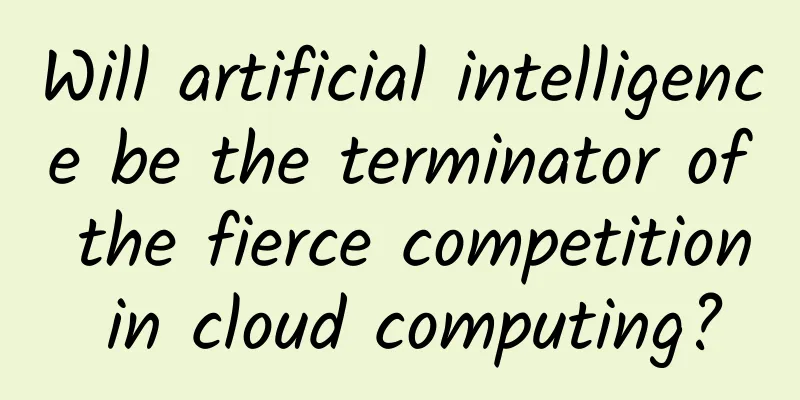Will artificial intelligence be the terminator of the fierce competition in cloud computing?

|
Recently, the well-known market research organization Gartner released a research report on the cloud service market in the second quarter of 2016. Amazon AWS alone accounted for 31% of the market share, Microsoft, IBM, Google and others ranked second with a total market share of 23%, and a number of manufacturers such as Alibaba and Oracle shared 46% of the market space. Although cloud computing services are still in the stage of staking out their territory and the market has just entered the explosive period, as Microsoft, Google, Amazon, Alibaba and other companies are competing to release cloud computing products, the homogeneity of basic cloud services is becoming more and more obvious. At the same time, Microsoft and Google have all regarded artificial intelligence and cognitive computing as another possible profit point. However, will artificial intelligence really become the terminator of the fierce competition in cloud computing? Cloud computing looks beautiful, but the price war is brutal At least compared to three years ago, the domestic cloud computing market is a completely different picture. Tencent and Baidu have entered the cloud computing market aggressively and are targeting Alibaba, which entered the market first. The entry of companies such as NetEase and Kingsoft has increased market uncertainty. In addition, Amazon AWS, Microsoft, IBM and others have also entered China. The Chinese cloud computing market has entered an era of fierce competition, with price wars as a typical sign. Since its launch in 2006, AWS has experienced more than 50 price cuts, including 42 price cuts in the market development period before 2014. After 2014, it encountered price wars with Microsoft and Google. The magnitude and frequency of price cuts are staggering. For example, in 2014, the price of AWS EC2 service plunged by as much as 40%. At that time, the market penetration rate of cloud computing in the United States was about the same as that in China, and there were signs of price wars in China. Even though there has been no clear statistics on the frequency of price cuts by Alibaba Cloud, judging from QingCloud’s recent implementation of the sixth self-funded price cut, it seems inevitable that the domestic cloud computing market will suffer a more severe wave of price cuts. The reason is not difficult to explain. On the one hand, whether it is Alibaba, Tencent, QingCloud in China or Amazon and IBM that entered the Chinese market through a channel, they all focus on the IaaS level. Perhaps the service capabilities and scales are different, and the problem of service homogeneity is inevitable; on the other hand, the players who entered the cloud computing market early saw IaaS services, which are also the cloud services with the greatest demand from users in the early stage, but it also means investing huge manpower and material resources in infrastructure such as servers and databases. In order to recover costs as soon as possible, selling computing resources has become the most direct choice and the most common profit model. In fact, in addition to the investment in infrastructure, the cost of cloud services themselves is not high and the profits are very considerable. Price cuts can not only lower the market threshold, but also effectively utilize idle resources. Especially when the giants currently control the market, there is relatively more room for price cuts. However, only a few companies such as Amazon can make profits at present, and it will take a "protracted war" to recover costs. When American cloud computing vendors were engaged in a price war, domestic companies such as Alibaba and Tencent also competed on prices during the same period. The former stopped because it found a balance between market and profit. I am afraid that the price competition in the Chinese market will become more and more cruel. Will AI and cognitive computing become a breath of fresh air in the cloud service profit model? At present, Microsoft and Google, two second-tier cloud computing players, have simultaneously sent out signals to the outside world that they hope to try differentiated profit methods at the AI and cognitive computing levels. And how will artificial intelligence and cognitive computing, which sound more sophisticated than cloud computing, rewrite cloud services? Since AlphaGo defeated Lee Sedol in the field of Go, Google has finally become the company at the forefront of artificial intelligence in the eyes of the audience. Combining artificial intelligence and cloud computing has naturally become Google's forte. Cognitive computing, a concept that has just attracted attention in the past two years, is interpreted as a system that can learn autonomously, think independently and provide people with "think tank" capabilities. It is inseparable from popular technology terms such as big data, cloud computing, the Internet of Things, artificial intelligence, and machine learning. Logically speaking, integrating machine learning technology into cloud services such as data storage and analysis may become another way to make money through technology. Amazon's Alexa voice-controlled home assistant and Google's latest photo service have also integrated cognitive computing and cloud services. In fact, there are precedents for the application of artificial intelligence in cloud services in China. For example, NetEase launched the Yidun anti-spam cloud service at the beginning of this year, applying the deep learning technology of artificial intelligence to the field of anti-spam, and Alibaba Cloud also launched Little AI, etc. These cases may prove that combining AI, perceptual computing and cloud computing can generate profits, and at the same time make the cloud service market richer and reduce the impact of homogeneity on the development of cloud computing. However, the combination of cognitive computing and artificial intelligence with cloud computing is novel but not advanced. Perhaps dynamic Internet companies such as Google and Amazon can make more attempts while competing for cloud computing. Faced with the fierce competition in the cloud computing field, it is still questionable whether some players can step away and think about more profits. The so-called breakthrough method is actually differentiated cloud services Whether it is artificial intelligence or cognitive computing, as well as the preference of many domestic cloud computing companies for live video broadcasting, they are all using differentiated cloud services to highlight their own advantages and gain a place in the cloud computing market. This also confirms another saying: cloud computing in the IaaS model is easy to be dominated by one or two companies, while scenario-based cloud services are still in the blue ocean. Looking at the domestic cloud computing market, there are not a few experts who advocate scenario-based cloud services. Such voices can always be heard in major cloud computing forums. In terms of actual actions, Alibaba Cloud and Tencent Cloud have begun to provide scenario-based cloud services, such as Alibaba Cloud's series of solutions for e-commerce, and Tencent Cloud's corresponding solutions for the WeChat ecosystem. The most typical example is NetEase Cloud, which just started in 2016. Specifically in terms of business, NetEase has launched a series of scenario-based cloud services to the market, including NetEase Cloud (instant messaging cloud), Qiyu (fully intelligent cloud customer service), Video Cloud, Honeycomb (container cloud), and Yidun (intelligent anti-spam cloud service). The advantage of new entrants such as NetEase in choosing scenario-based layout is that many cloud services are derived from the technical accumulation of many years of product research and development. They understand where the user pain points are and where the market potential is. After the advent of the cloud computing era, these technologies will be clouded and opened to the outside world. Indeed, this approach cleverly avoids direct confrontation with giants in the IaaS field, and is even more conducive to bringing in paying users to recover costs. Limitations also exist. First, at this stage, it mainly attracts small and medium-sized enterprise users, and large enterprises are more inclined to lease cloud computing infrastructure and develop corresponding functions; second, whether different services can be well compatible, such as the seamless connection between video cloud services and anti-spam services. From this point of view, scenario-based cloud services provide entrepreneurs with opportunities to enter cloud computing, but giants are likely to become the ultimate market harvesters. It is worth noting that Microsoft and Google are trying to use artificial intelligence and cognitive computing to create differentiated cloud services, rather than being limited to the PaaS and SaaS levels. It should be noted that both Google's App Engine and Microsoft's Azure were originally launched as PaaS platforms. The traditional IaaS, PaaS, and SaaS service classifications will gradually become blurred, and any single-level service will find it difficult to meet customer needs. It can be foreseen that the traditional cloud computing service classification method will gradually withdraw from the stage of history, and functional and scenario-based cloud services will gradually become mainstream. As a winner of Toutiao's Qingyun Plan and Baijiahao's Bai+ Plan, the 2019 Baidu Digital Author of the Year, the Baijiahao's Most Popular Author in the Technology Field, the 2019 Sogou Technology and Culture Author, and the 2021 Baijiahao Quarterly Influential Creator, he has won many awards, including the 2013 Sohu Best Industry Media Person, the 2015 China New Media Entrepreneurship Competition Beijing Third Place, the 2015 Guangmang Experience Award, the 2015 China New Media Entrepreneurship Competition Finals Third Place, and the 2018 Baidu Dynamic Annual Powerful Celebrity. |
<<: The so-called capital winter is nothing but the collapse of wishful thinking
>>: Looking at the decline of Japan's television industry, can China become the next South Korea?
Recommend
With the support of security chips, Android data encryption is becoming increasingly difficult to steal
Background of Android FBE In this article, we wil...
GAC Aion LX80 review: In the era of software-defined cars, how do electric motors crush internal combustion engines?
Domestic electric vehicles were once widely quest...
[Creative Cultivation Program] Can intestinal flora be "contagious"? I love you, so I share my intestinal flora with you!
Author: Zhao Bei It is said that people who live ...
The secret of how Douyin influencers sold goods worth 130 million in 6 months!
Why are short videos so popular? What is the real...
China Passenger Car Association: Global sales of new energy vehicles will reach 14.28 million in 2023, with China accounting for 63.5%
In 2023, China's new energy passenger cars ac...
How to drive user conversion through refined operations?
From now on, you need to transform your traffic t...
Tik Tok marketing promotion advertising model!
What are the marketing methods of Tik Tok? What p...
How to move an object weighing 100,000 tons without damaging it?
Science fiction: How to use modern technology to ...
The era of paid content: both a hot topic and a hidden crisis
Last year, a wave of paid content entrepreneurshi...
Ocean Brothers Brick and mortar entrepreneurship strategist - brick and mortar store Douyin live streaming sales nanny-level practical account creation course
Ocean Brothers Brick and mortar entrepreneurship ...
The "Nine-tailed Fox" who is unwilling to be a relative of human ancestors is not a good turtle
Starting from the birth of the first fish during ...
Electronic Technology Special Report: Can the victory of PlayerUnknown's Battlegrounds over League of Legends, a gold medal game owned by Tencent, indicate that League of Legends is heading for a trough?
Steam's new overlord: PlayerUnknown's Bat...
Say goodbye to information asymmetry and restore the true truth about mobile phone repairs!
Some time ago, Ms. Wang from Wuhan repaired her m...
Soil is alive! These bugs help plants grow
Produced by: Science Popularization China Author:...
Is there online fraud in the animal world? This is not about money but about life! | Species Chat
We often say that we should be careful of online ...

![[Creative Cultivation Program] "From fish to humans" has more evidence, is the human middle ear transformed from fish gills?](/upload/images/67f25aa89805a.webp)

![[Must-Read for Internet People] After a few years in the industry, where should your future be?](/upload/images/67cc42c5e1aee.webp)





